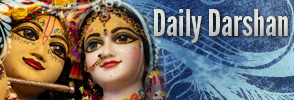O ne of the highlights of the Mayapur Gaura-purnima festival every year is, for some, the theatrical drama directed by His Holiness Bhaktimarga Swami. Every year, Bhaktimarga Swami works with a diverse cast and crew, many of them second or third generation ISKCON members, to create a dramatic performance for all of Mayapur’s visitors from around the world.
This year at the 2019 Annual Gaura-purnima Festival in Mayapur, Bhaktimarga Swami and his players performed “The Queen’s Secret.” This dramatic rendition focuses on two characters from the well-known epic from ancient India, the Mahabharata.
Queen Kunti and Prince Karna are the central characters of the drama, which portrays how Queen Kunti gave birth to Karna in her youth and then was forced to send him away and hide his existence. Their paths reunited many years later in the midst of the conflict between Kunti’s other sons, the Pandavas, and their cousins the Kauravas.
Those familiar with the story know the tragic outcome of the tale: how Karna was mistreated for supposedly being of a lower caste, was then befriended by the Pandavas’ enemy Duryodhana, and how the unknowing brothers were pitted against each other in events that culminated in the war of Kurukshetra.
It was a drama that moved the audience to tears, laughter, and of course applause.
“People feel for Karna,” Bhaktimarga Swami said. “He’s a tragic hero. His story is that of the underdog and how he climbed his way up to fame, but his dark karma followed him like a shadow.”
Bhaktimarga Swami first presented a version of this drama about ten years ago, and decided to bring it back by popular demand. He was first inspired to produce this drama after reading the Mahabharata and after watching a rendition of the tale performed by the stalwart ISKCON thespians Rasajna Devi Dasi and Lohitaksa Dasa.
The message of the drama, according to Bhaktimarga Swami, is the power of emotions. The story shows the bondage that comes from love, and it shows that loyalty and love are born of kindness and association and not of family. Although Karna was the eldest of the Pandava brothers and the son of Queen Kunti, his loyalty was to his adopted parents and his friend Duryodhana.
In a tearful scene between Queen Kunti and Karna, Karna expresses this to Kunti. He refuses her request to come to the side of the Pandavas. The audience was moved to tears as Karna leaves Kunti unappeased, thereby sealing his own tragic fate.
“Our hearts go out to Karna because he was beaten down so much,” Bhaktimarga Swami said. “We don’t think he deserved his tragic ending. But because he was in the wrong company, he made the wrong decisions.”
The drama is a powerful reminder of the effects of association. Behind the scenes of the drama, the importance of association is also reflected in the experiences of many of the young actors and actresses.
Bhaktimarga Swami explained that many times, the parents of young actors and actresses come to him to express gratitude. “They felt that their children were at a crossroads in life, and participating in the drama gave them a new set of friends and new purpose – they now feel like they belong somewhere,” Bhaktimarga Swami said.
The time the players spend with each other is meaningful for many in their spiritual journey and in their personal growth.
“I see future leaders in the group that performed ‘The Queen’s Secret,’” Bhaktimarga Swami said. “This experience is an incredible confidence builder for them, and a springboard to something greater.”
Dramas have long been a part of the tradition of Gaudiya Vaishnavism. Lord Caitanya Mahaprabhu and Lord Nityananda were fond of dramas and Themselves performed in dramas many times. Rupa Goswami composed the two dramas “Vidagdha Madhava” and “Sri Lalita-Madhava.” He also wrote Nataka-candrika, or “The Illuminating Moon of Dramatics.” This book explains the rules of Gaudiya Vaishnava dramaturgy.
Srila Prabhupada himself was supportive of dramas. In New York after viewing the drama “Krishna Kidnaps Rukmini,” he remarked that watching these dramatic reenactments of Krishna’s pastimes is even better than reading his books.
Apart from helping practitioners of bhakti-yoga enter deeper into the pastimes of Lord Krishna and His associates, dramas can also be effective tools for outreach.
“It’s easier for the public to access new ideas and philosophical concepts when it comes through the channel of entertainment,” Bhaktimarga Swami said. “So from this point of view dramas are important. They move the actors and audience to another level of wellness.
“I believe that these lilas do bring you closer to Krishna. They’re so impactful that you cannot forget them,” Bhaktimarga Swami continued. “All the time people come to me and say, ‘Thirty years ago you did a play and it impacted me so much. I still remember when he said this or she did that. I still remember it all the time.’”
















Recent Comments